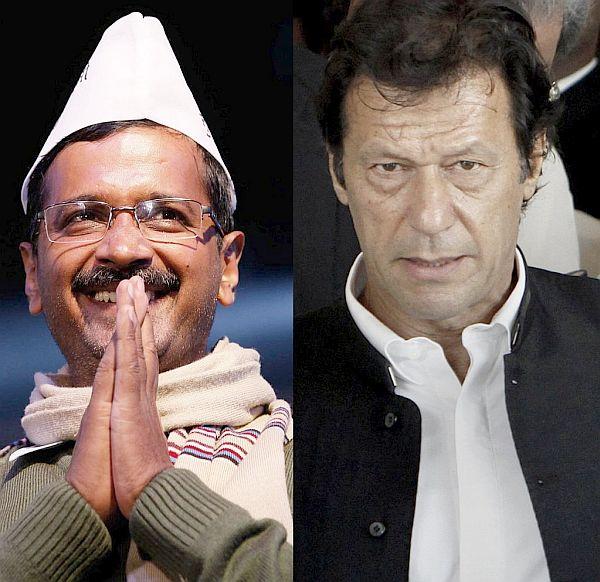
So remarkable are the parallels that can be drawn between Kejriwal and Khan, that it almost seems that they are clones of each other, says Sushant Sareen.
Political rhetoric and posturing during election campaigns not only tends to obfuscate issues but also helps to expose and lay bare the vacuity of many of the pretenders to the throne, if only for the discerning.
This is precisely what has started happening with the phenomenon called the Aam Aadmi Party.
Starting with immense goodwill of ordinary people who were disgusted with the venality, arrogance, malfeasance, misgovernance and sense of entitlement (all of it undeserved) of the United Progressive Alliance regime, the AAP has bit by bit started to expose itself.
And as the layers peel, the emerging image is not at all pleasant.
If anything, it increasingly is becoming clear that the AAP is fast transforming into an epitome of the very political culture which it so passionately railed against.
Far from being the ‘party with a difference’, the AAP is turning into what the aam aadmi in India colloquially would call ‘party with same difference’.
...
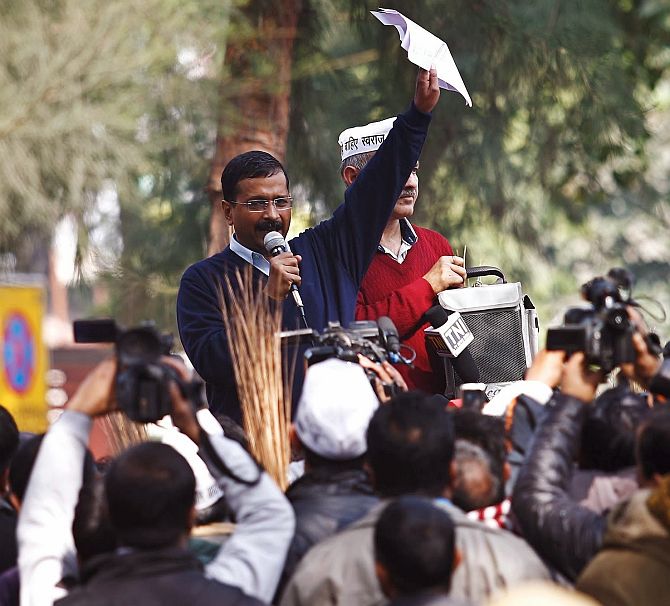
Like other political parties, the AAP too has developed a cult around its chief, Arvind Kejriwal.
The cult worship that is so visible in family and individual based parties like the Congress, the Bahujan Samaj Party and the Samajwadi Party is also visible in the AAP with Kejriwal being the ruling deity.
Along with the cult worship has come the coterie culture.
A small group has today started dominating and controlling access to Kejriwal.
This bunch derives it power and influence primarily from its closeness to the cult figure.
But like in other parties, the cult worship makes people ignore the coterie.
With the coterie has come the culture of quelling any dissent or counterview to what the ‘great leader’ and his cabal have decided. Disagreements are not only frowned upon but lead to either dissenters being side-lined or ousted from the party.
...
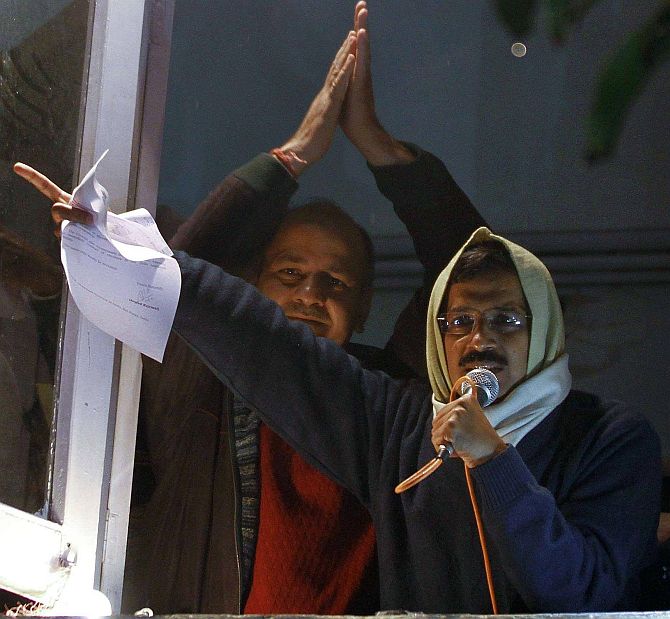
There is more that makes AAP ‘same difference’ with other mainstream parties.
The most glaring is of course the vote-bank politics which the AAP practises rather unabashedly. The unique selling proposition of the AAP was that it appeared to be a party that cut across caste, communal and even class divides and spoke about issues that concerned ordinary citizens.
This attribute of AAP endeared it to many modern, progressive and forward looking Indians. But as the ambitions of the AAP soared, this attribute became one of the first casualties.
The hobnobbing with dubious and fundamentalist Muslim clerics and the endorsement to khap panchayats are just but a couple of examples of the path taken by the AAP.
Other than vote bank politics, the AAP also took recourse to celebrity candidates, or if you will, ‘khaas aadmi’.
Overnight, a number of big names made a beeline for the party and not only were they enrolled but also were given tickets, ignoring the claims of the aam aadmi who had stood by the party.
Many of these celebrities had absolutely no contribution to make to the growth of the AAP and also have no real support base at the grassroots level.
Worse, most of these people live in a rarefied atmosphere and have no truck or touch with the aam aadmi.
...
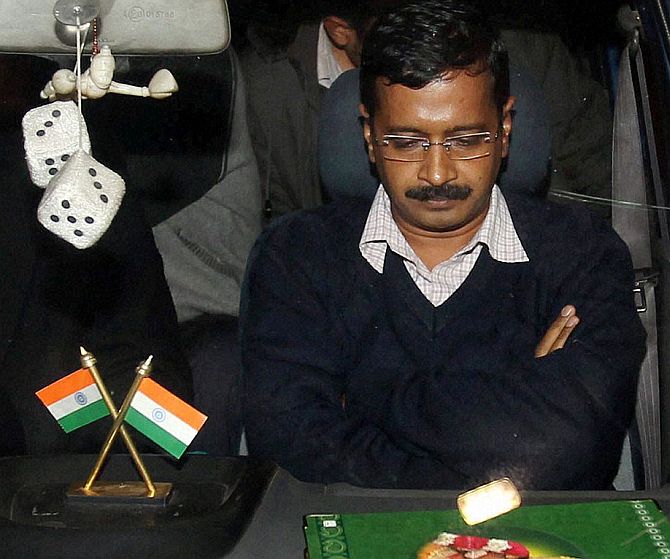
Another similarity which the AAP shares with many of the mainstream parties is that it has no policy on anything. It has slogans on everything, but clarity on nothing. In many ways, the AAP has a single agenda -- corruption -- and even on this it has no real idea on how to deliver.
Like the Taliban in Pakistan who claim that once shariah is imposed everything will fall in line, the AAP insists that merely the passing of the Jan Lokpal bill will solve the issue of corruption.
On other issues that affect the public -- law and order, national security, foreign policy, economic policy, development programs, the AAP has really nothing cogent or coherent to offer.
Depending on what is the flavour of the season or what will be popular and get it a few more votes, it makes a statement. But it never explains the logic or rationale behind the stand it has taken.
Essentially the policy is to ‘shoot and scoot’.
This same policy is adopted in bad-mouthing people and hurling calumny on someone because it will be popular among that section of the aam aadmi which loves the spectacle of people who have done well being pulled down and their names dragged through mud.
Prosecutable evidence is an inconvenience that AAP doesn’t bother with before it sullies someone’s reputation.
...
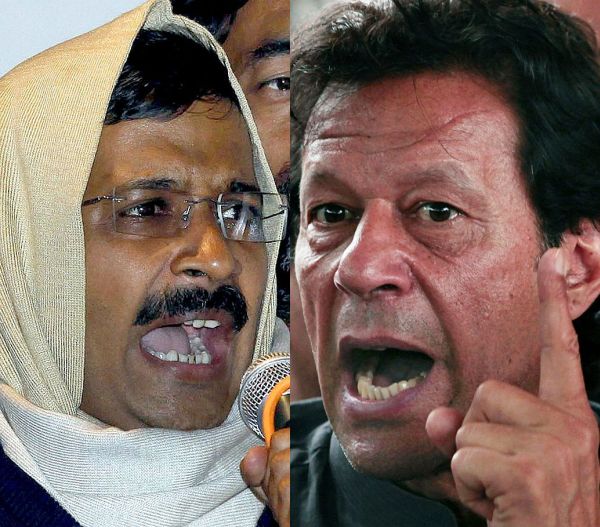
While there are clear and obvious similarities between the AAP and some other mainstream parties in India, an even more apt parallel can be drawn between AAP and the Pakistan Tehrik-e-Insaaf of Imran Khan (also known as Im the Dim or Taliban Khan).
So remarkable are the parallels that can be drawn between Kejriwal and Khan, that it almost seems that they are clones of each other.
Both Khan and Kejriwal represented a change from traditional politics when they first emerged as serious political players and both have belied those expectations.
Both have zero credentials as administrators but have sterling personal achievements to their credit -- Imran Khan was a world class cricketer who led his nation to victory in the World Cup; Kejriwal is a graduate from India’s premier institution, IIT, and also qualified in the civil services exam to join the Indian Revenue Service, and later winning the prestigious Magsaysay Award.
Both can trace their arrival on the political stage to successful rallies -- Imran Khan’s rally in Lahore in October 2011 and Kejriwal’s anti-corruption dharna in Delhi in 2012.
Both skillfully exploited the public angst against the shenanigans of the political class and its unrestrained and shameless corruption to strike a chord with the people of their countries.
...
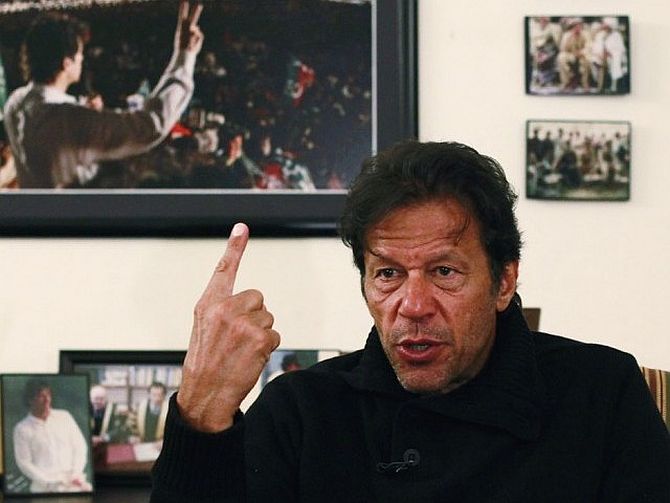
If Imran Khan targeted Nawaz Sharif during the campaign because he was the man to beat (Asif Zardari already been written off as a has-been), Kejriwal has trained his guns on Narendra Modi (Congress and Rahul Gandhi being virtual write-offs in the forthcoming elections).
Just as Imran Khan also took pot shots at Zardari but obliquely, Kejriwal takes pot shots at the Queen Mother and Heir Apparent, but obliquely.
In Imran Khan’s case the youth voter was seen as the x-factor and it was widely believed that he was the youth icon.
Similarly, the AAP seems to be finding resonance among the youth which is the visible face of his support base.
But just as when the votes were counted in Pakistan it turned out that most of the young people had in fact voted for Sharif, so it is likely to turn out in India where by all accounts Modi is seen as a more solid candidate with an established track record of good governance and as someone with a clear development program that will create jobs and opportunities.
The Pakistan People’s Party surreptitiously backed Imran Khan, convinced that he would cut into Sharif’s vote bank; the Congress too seems to have indulged Kejriwal in the fond belief that he would cut into the support that the BJP hoped to get from people disgusted with Congress corruption.
Of course, like Imran Khan who soon seemed to go out of control of his minders, so too with Kejriwal who seems to have damaged his backers more than anyone else.
Also, if Imran Khan was seen to enjoy the hidden support of the Inter Services Intelligence and other ‘deep state’ elements, Kejriwal has never convincingly answered charges of his connections with foreign donors like the Ford Foundation.
...
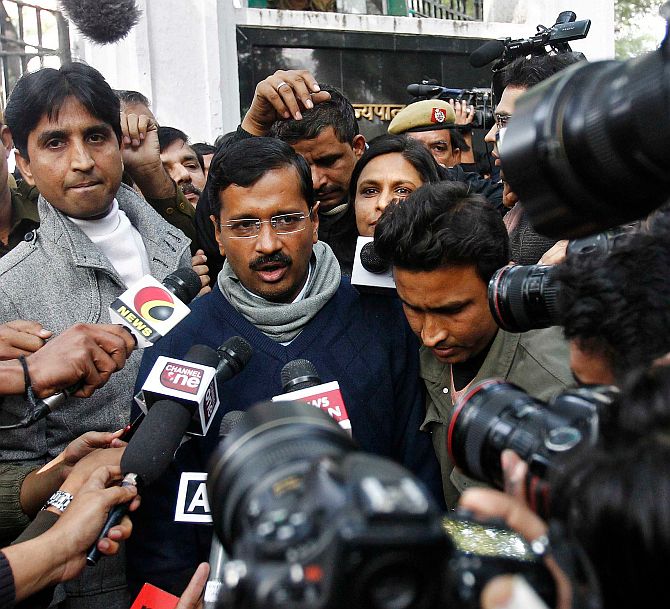
What is more, many of the NGOs that have become a part of the AAP campaign are believed to be surviving on funds that they receive from overseas.
While both Imran Khan and Kejriwal are quick to hurl abuse and accusations of wrongdoing against their opponents and their pet objects of hate, they seem to just clam up when it comes to accusations against their own close aides.
Both Imran Khan and Kejriwal have made good use of the social media to garner support and connect with the people. And their supporters often use the social media to intimidate, abuse and insult anyone who is seen as opposing them.
In this the supporters take a cue from the ‘great leaders’ who are abrasive and often obnoxious and always offensive in the way they indulge in muckraking against people.
Anyone who questions Imran Khan’s puerile Taliban policy is immediately accused of being a ‘dollar worshipper’ and an American agent’ anyone who questions Kejriwal’s wonky economic policies and his administrative and political decisions is accused of being ‘on (Mukesh) Ambani’s payroll’.
As long as the media unquestioningly lapped up everything Kejriwal said and did, he never accused it of being ‘Ambani’s agent’, but no sooner that he came under critical scrutiny, he started accusing the media of playing to ‘Ambani’s tune’.
...
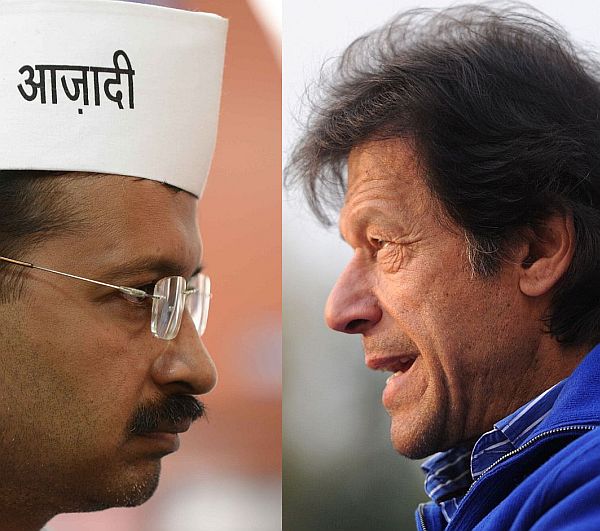
Similarly with Imran Khan who has targeted journalists who question his policies and expose his vacuity. Both Imran and Kejriwal have brazened it out in defence of their lieutenants who made politically unacceptable remarks.
For instance, there wasn’t a peep out of Imran Khan when the Khyber Pakhtunkhwa chief minister (who has been a member of practically every party in the province before finally landing up in PTI and being elevated to the post of CM not because of any great administrative ability but because he was a school mate of Imran Khan in Aitchison College) remarked that menial jobs should be reserved only for Pakistani Christians because they were good at cleaning sewers.
Kejriwal too did not really disassociate himself from Kumar Vishwas’ racist and misogynist comments against Kerala nurses (he thought he was being funny and AAP explained away the remarks as having been made a couple of years back as if that made them kosher).
On national security, both Imran Khan and Kejriwal and AAP are extremely dangerous for their countries. If Imran Khan is an apologist for the Taliban and Al Qaeda, Kejriwal has adopted an ambiguous stand on Maoist terrorists, Kashmiri separatists and Islamist terror groups like Indian Mujahideen (remember his stand on the Batla House encounter?).
Finally, both Khan and Kejriwal have proved themselves to be absolute disasters in administration.
The governance deficit is visible in both Khyber Pakhtunkhwa and Delhi, where instead of rolling up their sleeves and getting down to the tough business of cleaning the mess, both Khan and Kejriwal have resorted to political populism and tamasha.
Fortunately, Delhi got deliverance from demagogic Kejriwal and his gang in just under two months; Khyber Pakhtunkhwa however is still bearing the cross of having trusted a demagogue like Imran Khan.
Sushant Sareen is senior fellow, Vivekananda International Foundation